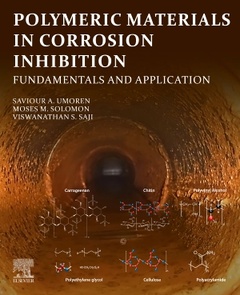Polymeric Materials in Corrosion Inhibition Fundamentals and Applications
Auteurs : Umoren Saviour A., Solomon Moses M., Saji Viswanathan S.

Polymeric Materials in Corrosion Inhibition: Fundamentals and Applications brings together the very latest information and techniques in the preparation and application of a broad range of polymeric materials as corrosion inhibitors in diverse corrosive environments. Sections introduce the fundamentals of polymeric materials, corrosion and corrosion inhibitors and include methodical coverage of polymers as corrosion inhibitors, with separate sections for natural and synthetic polymers. Each chapter guides the reader through the synthesis, properties and application of a specific polymer for corrosion inhibition, including an analysis of advantages and disadvantages and guidance on methods for improved performance.
Final chapter cover other important aspects and developments, including adsorption mechanisms, quantum chemical calculations, molecular dynamics and simulations. This is a valuable reference for researchers and advanced students across a range of disciplines, including polymer science, corrosion, electrochemistry, materials science, chemical engineering, and petroleum engineering.
PART I: THE FUNDAMENTALS 1. Basic Concepts I: Polymerization Structure and Properties 2. Basic Concepts II: Characterization and Applications 3. Basic Concepts of Corrosion 4. Fundamentals of Corrosion Inhibition
PART II: NATURAL POLYMERS AS CORROSION INHIBITORS 5. Chitosan 6. Chitosan derivatives 7. Cellulose and its derivatives 8. Natural Gums and Its Derivatives 9. Other Natural Gums and Gum Modifications 10. Pectin and derivatives 11. Alginate and derivatives 12. Starch and derivatives 13. Other Natural Polymers-Gelatin and Dextrin/dextran
PART III: SYNTHETIC POLYMERS AS CORROSION INHIBITORS 14. Polyglycols 15. Acrylic Polymers 16. Vinyl Polymers 17. Polyethers 18. Resins based polymers 19. Conducting polymers 20. Dendrimers 21. Copolymers 22. Polyaspartic Acid and Poly(Vinyly Pyridine) Polymers 23. Other Synthetic Polymers 24. Mechanism of corrosion inhibition by polymers
Dr. Moses M. Solomon is currently a Postdoctoral Researcher at the Center of Research Excellence in Corrosion, at King Fahd University of Petroleum and Minerals, in Saudi Arabia. His research interests focus primarily on the development of green corrosion inhibitors for diverse kinds of aggressive environments using polymeric materials. Dr. Solomon has authored over 65 journal publications and contributed 6 book chapters.
Viswanathan S. Saji is an Associate Professor at the Interdisciplinary Research Center for Advanced Materials, King Fahd University of Petroleum and Minerals, Dhahran, Saudi Arabia. His current research interest lies in electrochemistry and energy materials.
- Introduces the fundamentals of polymeric materials, applications of polymers, corrosion and corrosion inhibition
- Provides thorough, systematic coverage of their synthesis, characterization and application, all organized by polymer category
- Explores advantages and disadvantages of polymers in corrosion inhibition, along with methods to improve performance
Date de parution : 06-2022
Ouvrage de 634 p.
19x23.4 cm
Thèmes de Polymeric Materials in Corrosion Inhibition :
Mots-clés :
Acrylic polymers; Addition polymers; Adsorption; Alginate; Alternating copolymers; Amino acids; Amylopectin; Amylose; Atom transfer radical polymerization; Bacteria; Biodegradable polymers; Biomedical applications; Block copolymers; Carboxymethyl cellulose; Carboxymethylated starches; Carrageenan; Cathodic protection; Cellulose; Cellulose esters; Cellulose ethers; Cereal grain seeds; Chemical modification; Chemisorption; Chitin; Chitosan; Chitosan Schiff bases; Chitosan derivatives; Classification; Coatings; Composting; Condensation polymers; Conducting polymers; Coordination polymerization; Copolymerization; Copolymers; Corrosion; Corrosion inhibition; Corrosion inhibitor; Corrosion inhibitors; Corrosion rate; Crown polyethers; Daniellia oliveri; Deacetylation; Dendrimers; Density functional theory; Dextran; Dextrin; Dopants; Electrochemical impedance spectroscopy; Electropolymerization; Enhanced oil recovery; ß-cyclodextrin; Epoxy resin; Ethyl hydroxyethyl cellulose; Exudate gums; Free radical polymerization; Functionalization; Galacturonic acid; Gelatin; Gelatinization; Gellan gum; Grafting; Guar gum; Gum Arabic; Gums; HOMO; Hydroxyethyl cellulose; Hydroxypropyl methyl cellulose; Ionic polymerization; LUMO; Linear polarization resistance; Localized corrosion; Melamine-formaldehyde resin; Metals; Methoxy pectins; Methyl cellulose; Methyl hydroxyethyl cellulose; Molecular dynamics simulation; Molecular weight; Monte Carlo simulation; Nanocomposite; Nanocomposites; Nanocomposting; Natural polymers; Oligochitosan; Organic corrosion inhibitors; Packaging; Pectic acid; Pectin; Pectin classification; Phenolic resins; Physisorption; Pitting corrosion; Poly(aminoquinoline); Poly(cyanurateamine); Poly(vinylpyridine); Polyacrylamide; Polyacrylic acid; Polyamide; Polyaniline



